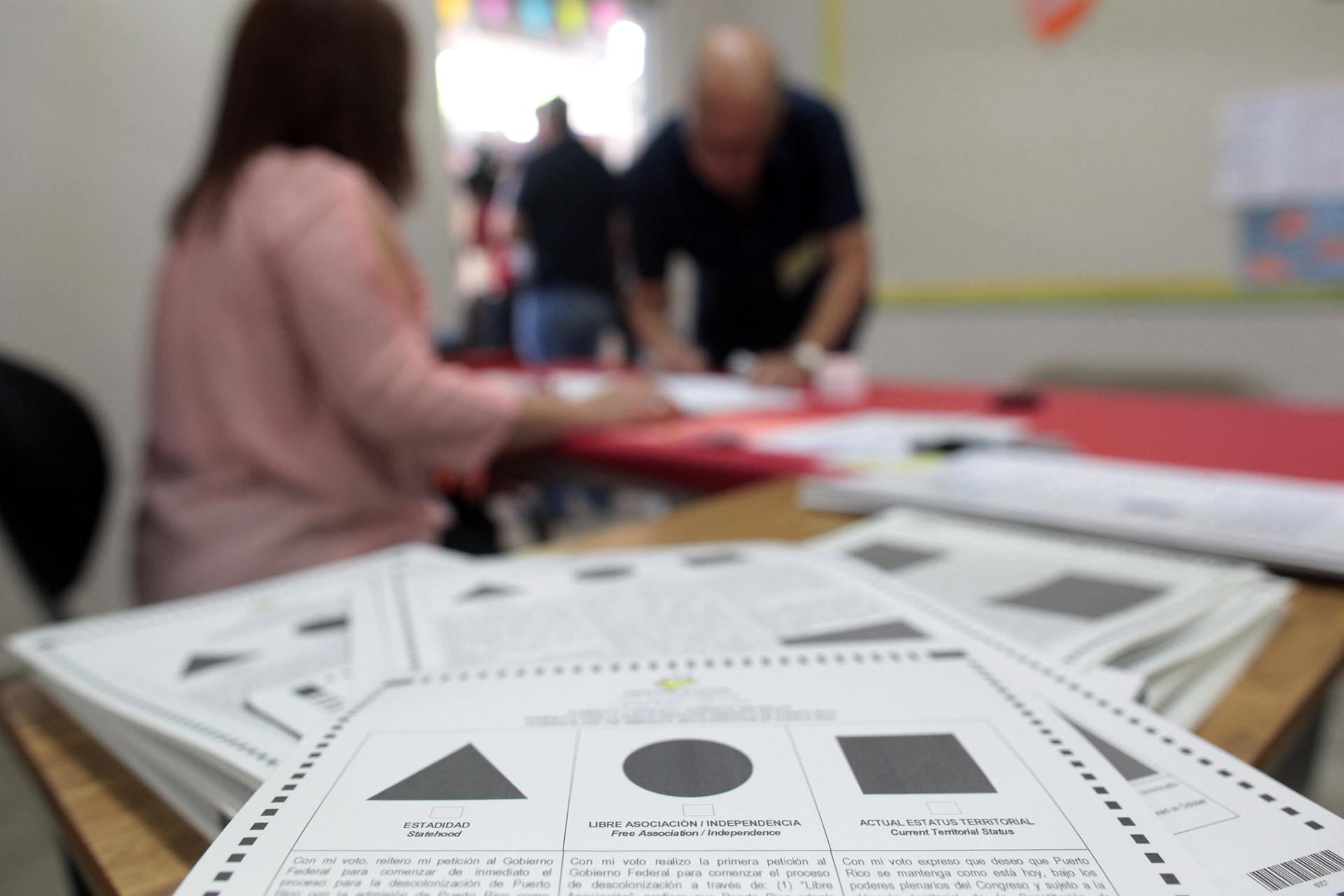Puerto Ricans go to the polls to vote on statehood
Ballot papers are seen at a polling station as Puerto Ricans head to the polls on Sunday to decide whether they want their struggling US territory to become the 51st US state, in Guaynabo, Puerto Rico, June 11, 2017.
To become a true US state, to choose independence or to maintain the status quo: Puerto Ricans went to the polls Sunday to consider their political future in a non-binding referendum many have vowed to boycott.
The Spanish-speaking US territory's referendum proposes "the immediate decolonization of Puerto Rico" — just as the bankrupt island is drowning in $70 billion in debt.
Its young governor, Ricardo Rossello, said that regardless of the crisis the referendum could not wait, repeating over the past several days in interviews and on Twitter that "the moment to vote for the decolonization has arrived!"
But the opposition Popular Democratic Party, which favors the status quo, sought on Sunday to play down the eventual results.
It predicted in a statement that "statehood will win by a landslide" because of the boycott by opposition parties. The Puerto Rican Independence Party has called the vote a "farce."
The boycott would seem to give an edge to voters favoring statehood, which the new government insists is the answer to the financial crisis hanging over the island of 3.4 million.
"I want to guarantee the future of my children and my grandchildren with the federal contributions" that statehood would bring, housewife Miriam Cruz told AFP after casting her vote.
'An unequal relationship'
Polls opened at 08H00 local (12H00 GMT), under an atmosphere of skepticism: opposition parties had not campaigned, there were no political caravans exhorting people to vote, and turnout appeared to be light.
Rossello, 38, accused the opposition parties of demagoguery, saying they had undercut the validity of the vote.
He came to power in January on the promise that he would work to end a long "colonial" relationship with the United States and make the island the 51st state.
The question of status is "fundamental" to breaking free from economic turmoil, said Christian Sobrino, chief economic advisor to the government.
"It is because Puerto Rico is in an unequal relationship" with the US government that the bankrupt island's finances are now under a largely US-appointed control board, he told AFP.
A former Spanish colony taken over by the US at the end of the 19th century, Puerto Rico has enjoyed broad political autonomy since 1952 as a commonwealth or "free associated state."
As American citizens, often proudly so, Puerto Ricans can freely enter the US — but don't have the right to vote for US presidents or elect representatives to Congress, even though US lawmakers have the ultimate say over the territory's affairs.
Many Puerto Ricans attribute the malaise plaguing the island to Washington's power over them.
For decades the territory enjoyed a US federal tax exemption that attracted many American companies to set up shop — but those breaks were ended in 2006, prompting firms to leave the island en masse.
An island divided
Beaten down by that loss in revenues and the global financial crisis, the island plunged into recession.
But the so-called "Caribbean Greece" found easy relief in US municipal bond markets, where investors could get attractive tax-exempt bonds that provided ready cash but sank the island deeper into debt.
The bubble ultimately popped and, unable to repay creditors, Puerto Rico declared bankruptcy in early May — the largest ever by a local US government.
Rossello has launched a drastic austerity regime to restore finances, but Washington still has the last word, via its oversight board.
Many islanders see the US authority as an intolerable stranglehold, especially considering that President Donald Trump has several times argued against bailing out the territory.
And putting on a largely ceremonial yet costly referendum — the fifth since the 1960s — when the government's coffers sit empty has those opposed to statehood up in arms.
Puerto Ricans pushing for independence as well as those urging to maintain the status quo are denouncing the vote as a "circus" and a "masquerade," emphasizing their willingness to boycott the vote.
"Public opinion is divided," said Edwin Melendez, director of the Puerto Rican Studies Center at the City University of New York. "Half the population, or more, believes that nothing will happen."
"The US government has no obligation to pay attention to the result," he said, arguing that it will "lack legitimacy" if a significant part of the electorate abstains.
Michelle Sierra, a hospital patient who cast an early vote in the plebiscite, favors US statehood: "We deserve a better future and my children deserve a better future."
Becoming the 51st star on the US flag would instill "new hope" in Puerto Ricans, she told AFP, as well as sorely needed economic aid.
But Lin Manuel-Miranda, the American composer of Puerto Rican origin who famously penned the Broadway musical "Hamilton," summed up in two rap verses the qualms of those who would rather not have such a discussion as the economy plummets.
"The great debate over statehood has to wait," he rapped. "That's Rose and Jack on the Titanic asking, When's our next date?"
